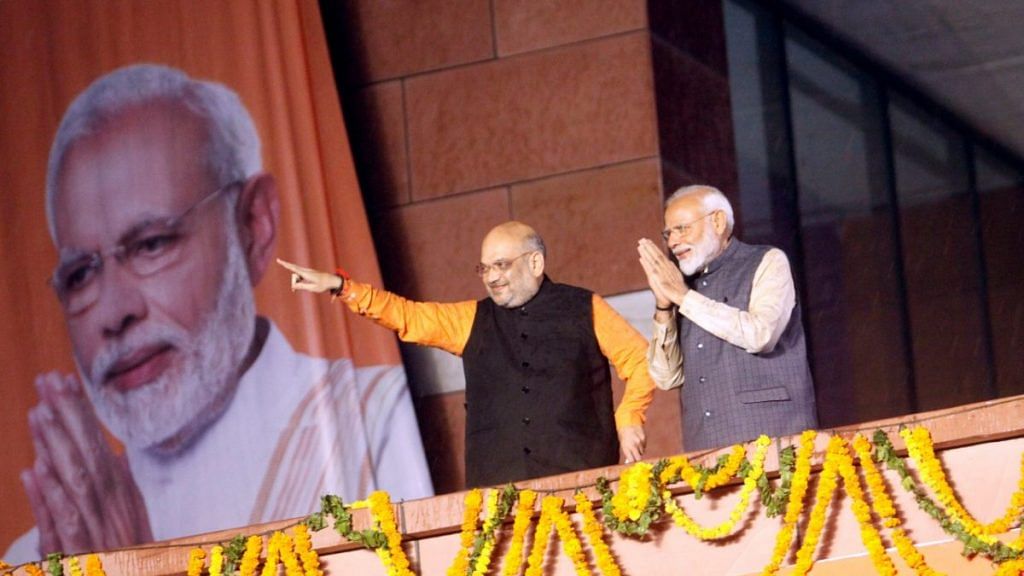With Amit Shah at the helm of affairs as the Union home minister, the Narendra Modi government will now take on the Kashmir issue much more assertively than it did in its first term.
One of the key shifts in the new government’s approach to Kashmir is that while prior to May 2019 the focus was on dealing with separatists with an iron hand, the focus now is to make the Kashmiri separatist and dynast leaders irrelevant altogether.
The Modi government is of the firm view that the National Conference (NC), the Peoples Democratic Party (PDP) and outfits like All India Hurriyat Conference have no influence beyond a handful of districts in the Valley. And, the top leadership of these parties have not allowed new leadership to emerge from the grassroots level.
These parties and outfits have been given undue weight, which doesn’t actually match their outreach or impact. The people of the state must stop relying on the Abdullah, Mufti and Nehru-Gandhi dynasties to help them solve the Kashmir problem.
Also read: After muscular policy, Modi govt hopes to win hearts of Kashmiris with ‘soft power’
The problem in the state
An analysis of panchayat polls held in the state during November-December 2018 helped the Modi government reach this decision. The local body elections were boycotted by both the NC and the PDP. But contrary to common perception and the apprehensions of naysayers, people turned out in large numbers with overall voting percentage at an impressive 74 per cent.
The most visible impact of this boycott was confined to only four districts of South Kashmir – Shopian, Kulgam, Anantnag and Pulwama. It was proof of the limited influence of the PDP and the NC.
So, the ‘New Kashmir Policy’ will focus more on building up a non-PDP, non-NC leadership from the grassroots level. Amit Shah, in his recent Rajya Sabha speech, said that he will crush “Pakistan-sponsored terrorism with the help of locals”. Shah’s outreach to the people of Jammu and Kashmir will ensure that political intermediaries, who want to maintain the status quo in the state, will soon become irrelevant.
For the last seven decades, successive governments relied on a certain set of leaders from a handful of families in the region to solve the Kashmir problem – namely the Abdullahs, the Muftis and the Nehru-Gandhis. The Modi government is of the view that the time has come for the people of Kashmir to move away from these families –they are not part of the solution, but actually, a part of the problem.
Also read: Full text of Amit Shah’s speech in parliament, laying out classic RSS/BJP view on Kashmir
The new Kashmir policy
The Modi government has a new multi-pronged Kashmir policy. The first part of the policy involves scaling up military action against terrorists in Kashmir.
The second part of this policy involves the relentless pursuit of individuals and outfits who claim to be self-styled representatives of the Kashmiri Muslims, and support radicalism, directly or indirectly. No one will be spared, however influential. The National Investigation Agency’s summons to the grandson of Hurriyat leader Syed Ali Geelani in relation to a terror funding case is proof of the Modi government’s steadfast commitment to this new policy.
The NIA has already seized assets worth about Rs 1,400 crore and has launched an investigation in 21 cases, Amit Shah said in Parliament. The Central Board of Direct Taxes and Enforcement Directorate are working overtime in the state identifying, tracking and shutting down all means to fund terrorist activities.
A massive crackdown on Jamaat-e-Islami has already begun. The outfit has a strong influence in south Kashmir and is largely held responsible for turning the four districts in the region into the hub of terrorism. This crackdown is going to get stronger in days to come until the outfit is made completely redundant.
Similarly, tougher action is being taken against separatists, not just cosmetic ones. Many of these leaders have been shifted to prisons outside Srinagar to places like Jhajjar and Hisar in Haryana and Tihar prison in Delhi. This is to ensure that the Valley does not come under their influence. The Modi government is no longer interested in treating them with velvet gloves.
Also read: Modi govt shows shift in Kashmir policy but a lot depends on Hurriyat, and Amit Shah
In a nutshell, the Centre is sending a message that it doesn’t consider the existing separatist leadership in the Valley to be the bona fide representative of the common people. It rather prefers to deal with people directly through the administrative apparatus by making it more robust and efficient.
One important shift in the new Kashmir policy is the redefining of ‘Kashmiriyat’. There is a big push to ensure that ‘Kashmiriyat’ doesn’t remain confined to merely Kashmiri Muslims. For Modi government, ‘Kashmiriyat’ is an all-inclusive concept– it takes into account the culture, traditions and stakes of Gujjar Bakarwals, Pahadis, Baltis, Dogras, Buddhists and Kashmiri Pandits.
The writing on the wall is clear: Narendra Modi and Amit Shah are discarding the old guard in the state and building a new leadership from the grassroots.
The writer is CEO of Indraprastha Vishwa Samvad Kendra. He has authored two books on the RSS. Views are personal.
